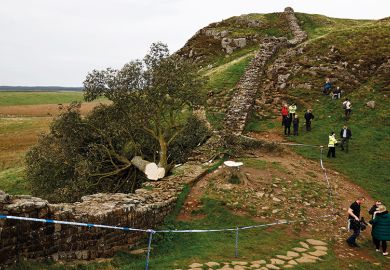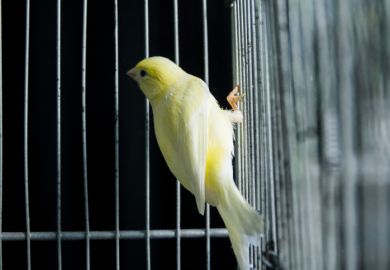The Open University is to cut £100 million of annual spending in a radical overhaul that is likely to lead to course closures and significant job losses.
Announcing a six-month review of all aspects of its operations, the UK’s distance learning institution, which has about 175,000 students, said that it was looking to save the equivalent of nearly a quarter of its £420 million annual budget.
More than half of the savings would be reinvested on an ongoing basis in retraining staff, developing technology and changing the curriculum to ensure that it was “digital by design” and delivered a “hands-on, highly personalised education” to students, said Peter Horrocks, the university’s vice-chancellor.
Speaking to Times Higher Education, Mr Horrocks was unable to say how many job losses would take place under the changes nor how many courses would be discontinued.
He said the OU, which is based in Milton Keynes but employs 4,400 academics and support staff and 5,000 associate lecturers around the UK, would “stay a broad-based university, but there are significant trimmings that can be made” by tackling duplication and inefficiency that had caused some areas of teaching and research to become loss-making over the years.
“The OU will still be the OU,” said Mr Horrocks, the former director of the BBC World Service who took charge of the university in May 2015, adding that it would “retain our core mission of offering higher education to all, regardless of background or previous qualifications”.
“But we will be delivering it in a different way, matching future needs to future technology.”
The cuts come even after the OU reported an operating surplus of £10.4 million in 2015-16, following several years of major deficits – £10.5 million in 2014-15 and £16.9 million in 2013-14 – and strike action by union members over the closure of seven regional centres.
Mr Horrocks told THE that the university “could be facing a significant operational shortfall of tens of millions of pounds in the years ahead” as numbers of part-time students continued to drop. Student numbers have fallen by almost a third since 2010, while its fixed costs had remained relatively static as competitors “cherry-picked” popular and profitable courses run by the OU, the university said.
Nonetheless, the OU would become “more important than ever” to lifelong learning, insisted Mr Horrocks, because it would provide “effective digital learning for people in work regardless of whether they had done a degree or not”.
As part of a two-year transformation programme, the university plans to offer a more “streamlined curriculum shaped to students’ needs and adaptable to change”, “high quality research focused closely on the teaching curriculum to maximise its impact”, “close links with employers to ensure the curriculum reflects the skills they need” and “a redesigned university free from duplication, overlapping responsibilities, unnecessary bureaucracy and inefficiencies that have developed over decades,” a statement said.
“We want to transform the University of the Air envisaged by Harold Wilson in the 1960s to a University of the Cloud – a world-leading institution that is digital by design and has a unique ability to teach and support our students in a way that is responsive both to their needs and those of the economy,” said Mr Horrocks.
“We were disruptive and revolutionary in our use of technology in 1969 and, as we approach our 50th year, we intend to be disruptive and revolutionary again, to transform the life chances of tens of thousands of future learners.”
Sally Hunt, the general secretary of the University and College Union, said that OU staff wanted more information about how jobs would be affected.
“Staff are understandably worried about plans that appear not to have been thought through, and they have little confidence in the next steps of the process,” she said.
Register to continue
Why register?
- Registration is free and only takes a moment
- Once registered, you can read 3 articles a month
- Sign up for our newsletter
Subscribe
Or subscribe for unlimited access to:
- Unlimited access to news, views, insights & reviews
- Digital editions
- Digital access to THE’s university and college rankings analysis
Already registered or a current subscriber? Login








